| Srl | Item |
| 1 |
ID:
119578
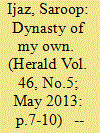

|
|
|
| 2 |
ID:
119580
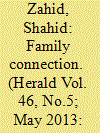

|
|
|
| 3 |
ID:
148549
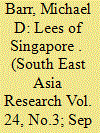

|
|
|
|
|
| Summary/Abstract |
It is no secret that a dynasty has emerged as the ruling force in Singapore. The Lee family (of former Prime Minister Lee Kuan Yew and current Prime Minister Lee Hsien Loong) is referred to as ‘the first family’ as a matter of routine in private conversation, though not usually in public. Power has already passed from father to son and now there is a generation of high-flying grandsons in the wings. This article traces the establishment and consolidation of the Lee dynasty from the point in the early 1980s when Lee Kuan Yew emerged as the centre of all the significant power networks in Singapore, through to the consolidation of power in the hands of his son, Lee Hsien Loong, in 2011. In the process of doing this, it argues that despite official rhetoric that says that the country runs on the talent of the best and most talented men and women in the country, and the closely related myth that professionalism provides the basis of governance, the reality is that of rule by a family-based clique of confidantes and relatives. There is a strong element of reality to both myths, but both elements are ultimately subordinated to and in the service of the forces of consanguineous and personal networks.
|
|
|
|
|
|
|
|
|
|
|
|
|
|
|
|
| 4 |
ID:
160428
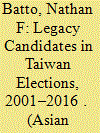

|
|
|
|
|
| Summary/Abstract |
Since inherited political resources may be inferior to personally accumulated resources, legacy candidates do best when facing mild competition, and shy away from intense competition. This is the first systematic empirical investigation of the extent of family politicians at both the national and local levels in Taiwan.
|
|
|
|
|
|
|
|
|
|
|
|
|
|
|
|
| 5 |
ID:
188240
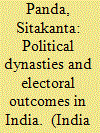

|
|
|
|
|
| Summary/Abstract |
Political dynasties, a salient feature of the electoral politics in many electoral democracies, have critical governance implications. However, careful empirical estimates of the dynasty premium in Indian elections and explanation of their constituency-level demand side (voters) and supply side (political parties) determinants are absent. To fill this gap, we analyze the candidate-level (N = 8251) data on the 2014 Lok Sabha elections and find that a dynastic candidate is a significant 13% more likely to win and has a significant 18%–20% higher vote share than a non-dynastic candidate. This result is robust to consideration of an alternative dynasty variable as outcome, usage of alternative indicators of candidate criminality as controls, and a procedure of deducing bias due to selection on unobservables from selection on observables. In the constituency-level analyses, having a dynastic incumbent legislator in fray and dynasts’ relative wealth increases the probability of a dynastic winner and a more competitive election given the dynastic incumbent reduces it. Voter dissatisfaction, dynasts’ relative wealth, reserved constituency, and given a dynastic incumbent, higher political competition reduce voter preference for dynasts, whereas dynastic entrenchment and dynastic incumbent reduce it. The dynastic incumbent, dynasts’ relative wealth, and voter dissatisfaction significantly increase political parties’ preferences for dynasts.
|
|
|
|
|
|
|
|
|
|
|
|
|
|
|
|
| 6 |
ID:
145461
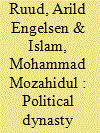

|
|
|
|
|
| Summary/Abstract |
Political dynasticism in South Asia and elsewhere is extensive, but poorly understood. To investigate the phenomenon, we look at political competition at the regional level in Bangladesh. We argue that mechanisms and tools in the local political culture that give rise to other aspects of South Asian politics also give rise to dynasticism. Networks of political activists, enforcers, businessmen and bureaucrats are crucial to political success. We hypothesise that these networks depend on the heir's ability to embody a vital but informal trust. Political dynasticism is thus more a coincidental than a strategic outcome.
|
|
|
|
|
|
|
|
|
|
|
|
|
|
|
|